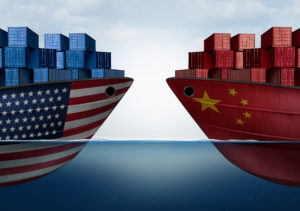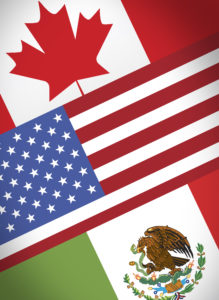News & Insights
Section 301 Tariffs on Chinese-Origin Goods Imported into the United States Are Now in Effect
On July 6th (12:01 a.m.), the Section 301 tariffs on imports of certain Chinese goods into the United States officially went into effect. Goods classified in one of the covered subheadings that are products of China are now subject to a 25% ad valorem rate of duty in addition to the applicable general (Column 1) rates of duty and any antidumping or countervailing duties. It should be noted that the Section 301 duties only apply to products of China (i.e., Chinese-origin goods)—non-Chinese origin goods that are exported from China are not subject to the tariffs. The increased tariffs are the result of an investigation by the U.S. Trade Representative (USTR) into China’s practice of requiring U.S. companies to transfer their intellectual property rights and technologies to Chinese companies in order to obtain business licenses and approval to invest in China. The USTR determined that these practices were unreasonable, discriminatory and restrict U.S. commerce.
The Section 301 tariffs impact over 800 Harmonized System classification subheadings and target strategically important products or that relate to Chinese industrial programs such as “Made in China 2025.” The USTR is also seeking public comments on the imposition of Section 301 tariffs on additional goods classified in 284 tariff subheadings which are identified in Appendix C to its Notice of Action. Written comments on the inclusion of Appendix C goods in the Section 301 action are due on July 20, 2018. The USTR will then hold a public hearing on July 24th and any rebuttal comments must be submitted by July 31st. Thereafter, the USTR will issue a formal determination on the additional products that may become subject to the Section 301 tariffs. For a complete listing of affected HTSUS subheadings, see Annex A and Appendix C to the USTR’s Notice of Action (83 Federal Register 28710, June 20, 2018).
The USTR also announced that it would entertain requests for product exclusions from the Section 301 tariffs. In reviewing exclusion requests, the USTR will consider whether a product is available from a source outside of China, whether the additional duties cause severe economic harm to the requestor or other U.S. companies, and whether the product is strategically important or related to Chinese industrial programs. When an exclusion request is submitted to the USTR, the public will have fourteen (14) days in which to file responses. Then, all interested persons will have seven (7) days in which to submit formal replies to the public comments. Exclusions will be considered and granted on a product basis, which means that the exclusion will apply to all imports of the product in question whether the importer filed the exclusion request or not. Requests for Section 301 exclusions must be submitted online via the regulations.gov website by October 9, 2018. If exclusions are granted, they will apply retroactively back to July 6, 2018.
U.S. Customs and Border Protection (CBP) also issued guidance to importers and customs brokers on the entry of goods subject to the Section 301 tariffs in Cargo Systems Messaging Service (CSMS)#18-000419. Specifically—
- When Chinese-origin goods that are subject to the Section 301 tariffs enter the United States, U.S. importers are required to declare the HTSUS classifications that normally apply to the goods as well as the special Section 301 tariff classification (HTSUS 9903.88.01).
- The 25% Section 301 duty rates do not apply to goods that are entered under HTSUS Chapter 98, such as HTSUS 9801 or 9802—in such cases the U.S. importer must declare HTSUS subheading 9903.88.01, the applicable HTSUS Chapter 98 subheading, and the Chapter 1 – 97 HTSUS classification that normally applies to the merchandise in question.
- Section 301 duties are eligible for duty drawback.
- Section 301 duties will apply to products from China that are entered under free trade agreements or special trade programs.
- With respect to Foreign Trade Zones (FTZs), affected products that enter into a FTZ on or after July 6th (except for those eligible for admission under Domestic Status) must be entered as Privileged Foreign Status (PFS)—they will be subject to the Section 301 duties or any applicable quantitative restrictions upon their withdrawal from the FTZ for consumption.
In response to the Section 301 actions by the United States, China responded by imposing 25% tariffs on U.S.-origin goods classified under 545 separate Harmonized System subheadings. The affected U.S.-origin goods include agricultural products including cotton, automobiles such as SUVs and electric vehicles, whiskey, dog food and tobacco.
If you have any questions regarding the Section 301 tariff increases, exclusion requests or other international trade issues, please contact either Melissa Proctor at Miller Proctor Law PLLC (melissa@millerproctorlaw.com).
News & Insights

Cheers to Lower Federal Excise Taxes on Imports of Beer, Wine and Distilled Spirits!
On December 22, 2017, “The Craft Beverage Modernization and Tax Reform Act” (“the Act”), was signed into law by President Trump making significant changes to the federal excise tax rates assessed on wines, distilled spirits and beer. The Act formally

Who Will Blink—U.S. or China? U.S. Proposes to Retaliate against China’s Retaliatory Measures
The U.S. appears to be moving deeper into its trade dispute with China. Late in the day on July 11th, the U.S. Trade Representative (USTR) announced that the United States may impose additional 10% ad valorem duties on an entirely


